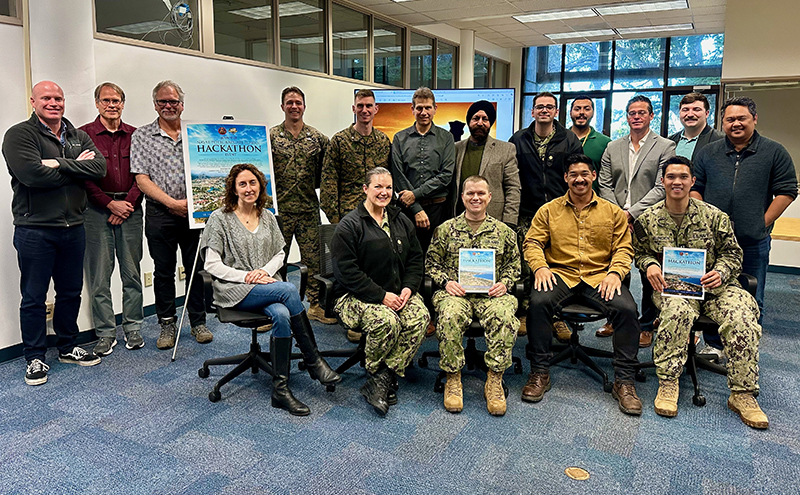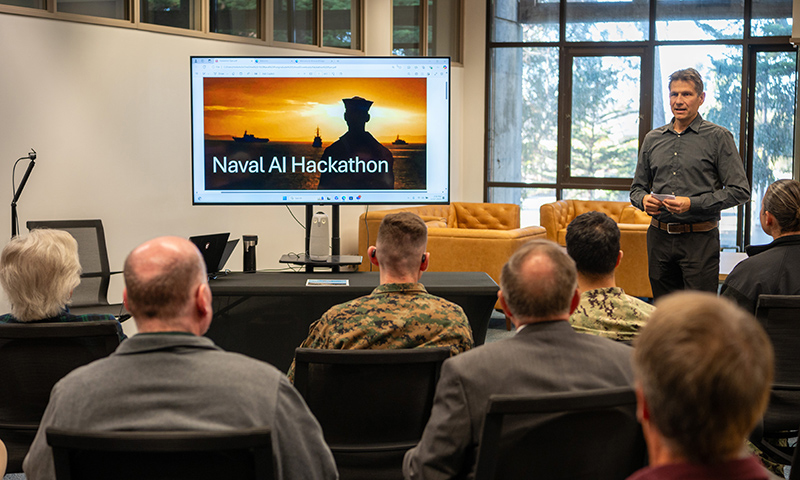The Naval Postgraduate School (NPS) recently hosted its inaugural artificial intelligence (AI) Hackathon event in the newly established Emerging Technology and Innovation Lab at the Dudley Knox Library, Dec. 13-17, 2024.
The event was the culmination of a course designed to give students hands-on experience in applying AI and machine learning (ML) technologies to real-world defense problems in partnership with the Marine Corps Tactical Systems Support Activity (MCTSSA).
Three teams of students worked to refine and enhance the Lessons Learned/After Action Report (AAR) support tool—a critical system developed for the Marine Corps Center for Lessons Learned (MCCLL) —to analyze operations and foster organizational improvements across the force. Students leveraged the power of NPS’s High Performance Computing (HPC) Center and its “Hamming” supercomputer to apply AI and ML techniques to analyze data and improve the tool’s ability to provide actionable feedback.
The Lessons Learned tool is vital for the Marine Corps as it captures valuable insights from every operation, ultimately shaping future missions and improving effectiveness. MCTSSA approached NPS to work with students on applying cutting-edge technologies to enhance the tool's capabilities, ensuring that the Marine Corps can continue to evolve and adapt to new challenges.
AI is one of 14 critical defense technology areas in the National Defense S&T Strategy. With a focus on AI/ML, the event reflected the growing importance of these technologies in modern military operations. The course provided in-depth knowledge of AI/ML tools and platforms, including real-world project analysis, team collaboration, and the integration of industry-standard and emerging technologies.

Naval Postgraduate School (NPS) students participate in the inaugural NPS AI Hackathon event held in the Dudley Knox Library on Dec. 17. The NPS AI Hackathon brought together three teams of three students, each representing diverse backgrounds, specializations, and military services, to address a real-world challenge in collaboration with the Marine Corps Tactical Systems Support Activity.
“We’ve spent this quarter exploring the available AI and ML tools, learning both how to use them effectively and how to collaborate in applying the technologies to real-world problems,” said Lt. Cmdr. Margaret Graves, an NPS graduate student who participated in the event. “The Hackathon format provides a unique opportunity to synthesize our skills as a team and contribute to potential solutions that could directly support the Marine Corps in enhancing operational readiness.”
In addition to the technical challenge, the event fostered significant opportunities for skill expansion, networking, and cross-disciplinary collaboration. Students had the chance to work closely with their peers from different military services and specialties, exchanging ideas and strategies to tackle the task at hand. The event also allowed them to connect with industry professionals and military experts who provided mentorship and guidance throughout the competition.
The AI Hackathon concluded with public presentations on Dec. 17 where teams showcased their solutions to military leaders and industry experts. This brief provided an opportunity for students to demonstrate the tangible outcomes of their hard work and to receive feedback that will further shape their academic and professional growth.
“This event is a great example of how NPS blends academia with practical application,” said Mathias Kolsch, an associate professor in the computer science department. “By working side-by-side with MCTSSA and using cutting-edge tools like LLM toolchains on our GPU-studded Hamming supercomputer, these students gained hands-on experience that will serve them in the short term as well as throughout their careers. It's an excellent example of how our curriculum prepares students for the challenges they will face in the military and in the rapidly evolving field of technology.”
By encouraging realistic engineering team collaboration and the use of cutting-edge technologies, the AI Hackathon is setting the stage for the next generation of military and civilian leaders.
“We’re excited about the potential for hackathons to become a regular part of our computer science curriculum and to create stronger links between academic pursuits and various operational commands,” said Dr. Gurminder Singh, the computer science department chair. “The skills students develop during such hackathon would be directly applicable to real-world military operations, and we are already looking forward to the next competition with a new set of challenges and new topic partners.”



